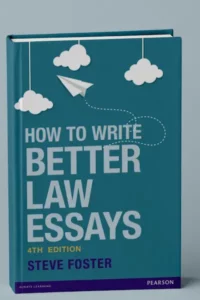How to Write Better Law Essays is your indispensable guide to succeeding in written law assessments, helping you to research, write and present assignments with the precision and clarity required to achieve the best grades at degree level.
How to Write Better Law Essays
Many students find the transition between A level and undergraduate study quite daunting. Good marks, even passes, are no longer guaranteed simply by learning and mentioning all the relevant points.
They are now expected to write with greater clarity and precision, to employ sounder grammatical and writing skills, to research and refer to a variety of primary and secondary sources and to be critical and analytical in their work.
Furthermore, as law undergraduates, students are expected to write with an air of legal professionalism, to support their arguments with legal authority and to employ solid referencing and citation skills. In practice, it is these aspects of undergraduate study that pose the greatest test to students, and I have received consistent feedback from lecturers on this: ‘Students find it difficult to write clearly, access appropriate sources, reference properly, dissect and answer the question and take a logical and critical approach to their answers.’ There is also increasing pressure on students to achieve higher marks in their undergraduate assessments — and their overall degree — and the acquisition of the above skills is essential if that is to happen.
The main aim of this book is to identify good research and writing skills, particularly in the preparation and submission of assessments in law. Throughout the book, the author identifies the key characteristics of good (and bad) techniques in writing law assessments and prepares students for the submission of their assignments. The text is related to many legal skills and method courses, and students are referred to the skills taught on such modules, such as using a (law) library, reference and citation skills and other general and specific study skills.
In particular, the text offers clear and simple advice to both those students who find the handling of legal materials difficult — and who find the task of preparing and writing law assignments daunting — and those who want to gain extra marks by writing better — perhaps the best — essays.
The text takes the student through the entire process of researching, writing and presenting law assignments, from the early stages of research and planning to the presentation of the work itself.
It provides practical advice to students on how to make the best of lectures, seminars and textbooks during their programme, thus enhancing their chance of success in assessments. It also shows them how to research and plan their assessments; how to write clearly, simply and in an appropriate legal style; how to conduct effective research and employ legal reasoning and critical thinking; how to cite and use legal authorities; how to avoid plagiarism; how to explain and apply legal principles and materials; and how to compile proper and appropriate bibliographies. With respect to plagiarism, the book stresses the benefits of employing proper referencing, and the rewards that students can obtain from good practice in this area.


